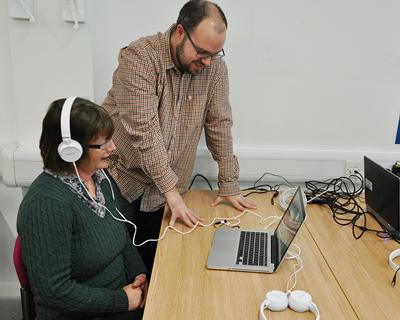New programme launched to help cochlear implant users enjoy music again

Academics in Music have contributed their expertise to a new computer-based music rehabilitation programme to help cochlear implant (CI) users enjoy music again.
Professor David Nicholls, Drs Ben Oliver, Richard Polfreman and Ms Sarah Hodkinson worked on the Interactive Music Awareness Programme (IMAP) with colleagues elsewhere in the University. It is a free, online music aural rehabilitation programme developed with adult CI users over three years through a series of consultations, music workshops and a trial. It now includes a larger library of music, featuring major artists such as Sir Cliff Richard and 10cc.
Dr Ben Oliver says: “Cochlear implants can enable severely or profoundly deaf people to perceive sounds and understand speech. However, current devices are very poor at conveying pitch information and therefore, although many CI users express a desire to hear music again, many are dissatisfied with the way music sounds through their implant.
“We hope that IMAP helps CI users re-engage with music and help them recognise specific features of music through their implant, such as melodic pitch and the timbre of musical instruments.”
The programme guides the user through 24 half-hour sessions with written and subtitled video instructions on how to use one of over 20 interactive applications. These applications allow the user to create, manipulate and play music using different combinations of instruments, pitch ranges and rhythms. Each session ends with a mini online listening task (to help users discover new music on the web) or a fun test (to see how much the user has learned).
The multidisciplinary team behind this project also included Dr Rachel van Besouw and Ms Mary Grasmeder from the Institute of Sound and Vibration Research, and Dr Mike Wald and Mr Magnus White from Electronics and Computer Science. It was funded by the Arts and Humanities Research Council (AHRC).